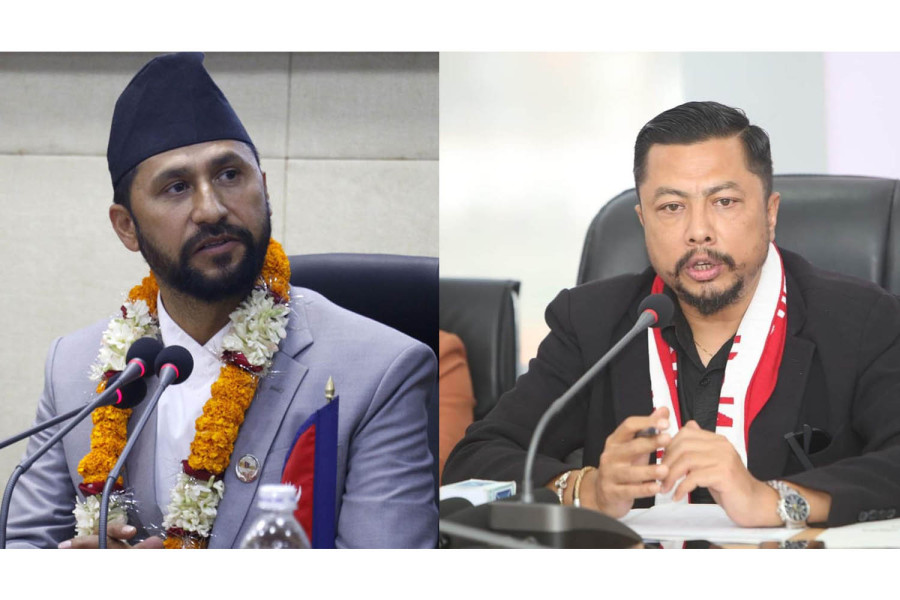Politics
Why are RSP leaders voicing doubt about their continuity in government?
Home Minister Lamichhane on Friday and Sports Minister Shrestha on Saturday said their love for power wasn’t very deep.
Purushottam Poudel
What’s cooking in the Rastriya Swatantra Party? Why are the leaders of the fourth-largest party in the House of Representatives and the third-largest partner in the Pushpa Kamal Dahal-led Cabinet giving statements hinting at their possible exit from the government?
Some remarks made by the RSP ministers have fuelled speculation.
On Saturday, Minister for Youth and Sports Biraj Bhakta Shrestha of the same party remarked that the time has come to review their participation in the government and its support to the coalition. Addressing a function organised to mark the establishment day of the RSP, he went on to say that they were ready to quit the government if needed.
“We are always carrying our resignation letter in our pocket, and the paper may be pulled out any time,” he said.
On Friday, Deputy Prime Minister and Minister for Home Affairs Lamichhane, who is also the RSP president, complained that though they were in the government, others were controlling state power in a true sense. Many wondered if Lamichhane had started getting frustrated with the government.
Addressing a press briefing organised on the occasion of Lamichhane’s 100 days in the home ministry, he said, “Though we are in government, we don’t know who is exercising the state power. Power has been controlled by some others for a long time, and it is a bit difficult to break that nexus.”
However, some lawmakers from the party the Post spoke to voiced ignorance of why the party’s ministers were making such remarks.
The RSP put on an impressive performance at the 2022 election, capitalising on the public’s frustration with traditional parties.
Minister Shrestha said they were treading a tough path and were ready to quit the government if they were coerced into making unnecessary compromises.
Shrestha said that after they joined the government, they realised that the country’s misgovernance was more serious than prevailing social malpractices.
In the last week of December in 2022, Dahal became prime minister for the third time with the support of the CPN-UML and the RSP, among other parties. Dahal later ditched them and joined hands with the Nepali Congress to form a new Cabinet.
After 14 months, Dahal sent the Nepali Congress out of power and brought the UML and the RSP into the coalition on March 4 this year.
Hundred days after the latest change in the power equation, statements from the leaders and ministers of the third-largest coalition partner have made watchers curious about their intentions.
Asked what was going on inside their party, RSP lawmakers expressed their ignorance. They said they had no idea about the party’s future moves and leaders’ mood as there had not been enough meetings, discussions, and interactions recently.
“We would know what is going on in the party and the government only if there were party meetings,” the lawmakers told the Post asking not to be named. “Only a select group of leaders make party’s decisions, and we are kept in the dark.”
Kabindra Burlakoti, the party's deputy general secretary, however, tried to downplay Shrestha's statement as generic. He said Saturday’s statement by the minister is nothing different from the ones party leaders have been saying since joining the government. His statement does not imply that the party is seeking to recall its ministers, added Burlakoti.
“Until our party has a free hand to work in the government, we are not considering withdrawing our support,” Burlakoti told the Post.
Experts, however, say Lamichhane is trying to cover up his failure to deliver. The party that rose with tall promises made during the election campaign is failing to live up to its pledges. It has courted controversy in multiple cases, including the cooperative scam.
“The party has a free hand in the government,” Krishna Pokharel, a professor of political science, told the Post. “I see no reason for the party to blame its coalition partners.”
After the Ilam-2 by-election on April 27, RSP General Secretary Mukul Dhakal travelled to various places to study the reasons for the party’s defeat in the bypolls.
During the general secretary's visit to various districts, well-wishers shared their advice that it would have been better had the party focused on organisation-building rather than joining the government, deputy general secretary Burlakoti said.
“However, the party is not considering a radical move immediately,” Burlakoti added. “The advice given to our general secretary during his nationwide tour was received as feedback. The party is in no mood to quit the government.”
Experts, however, say RSP leaders might be anxious about the report and recommendations of the parliamentary probe committee formed to investigate the cooperative scam. Lamichhane has been accused of embezzling millions of rupees from various cooperatives when he managed the now shuttered television Galaxy 4K.
The parliamentary committee has been mandated to figure out if the cooperative money was rerouted to the Gorkha Media Network. Lamichhane was the managing director of the media company that operated the television.
“Anticipating the possible outcome of the probe, the RSP could have started to bargain with ruling partners,” Jhalak Subedi, a political analyst, told the Post. “They might have tried to use the situation to win public sentiment.”
But Burlakoti denied such a possibility.
“We are confident that our party president won’t be implicated by the probe,’’ he said. “Then there is no question our party leaders should be bargaining with the coalition partners.”




 10.12°C Kathmandu
10.12°C Kathmandu















